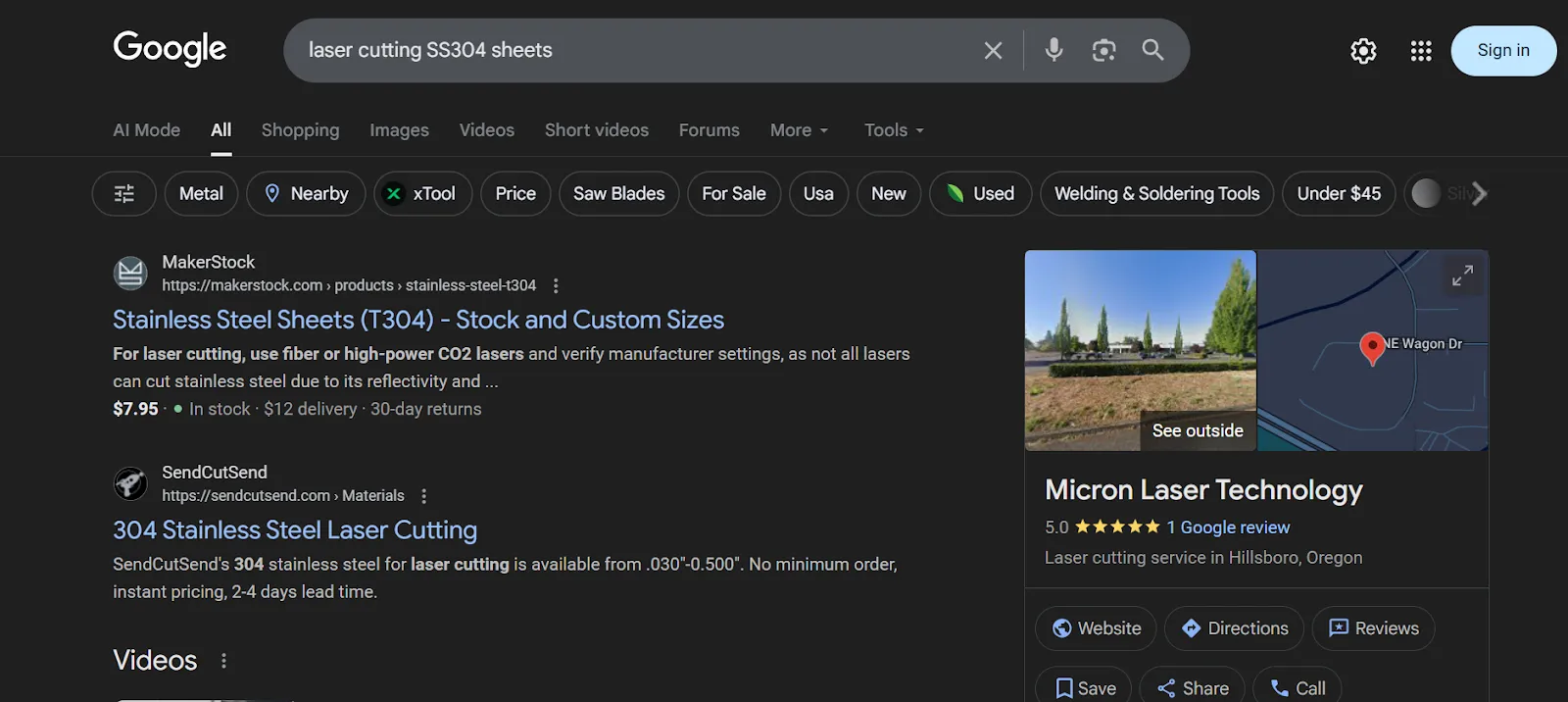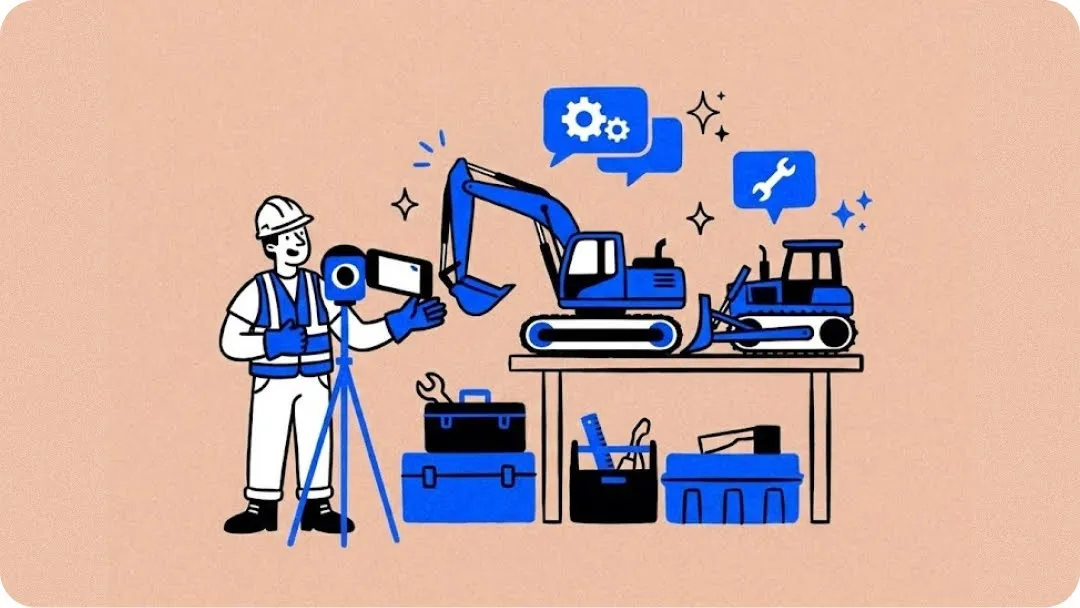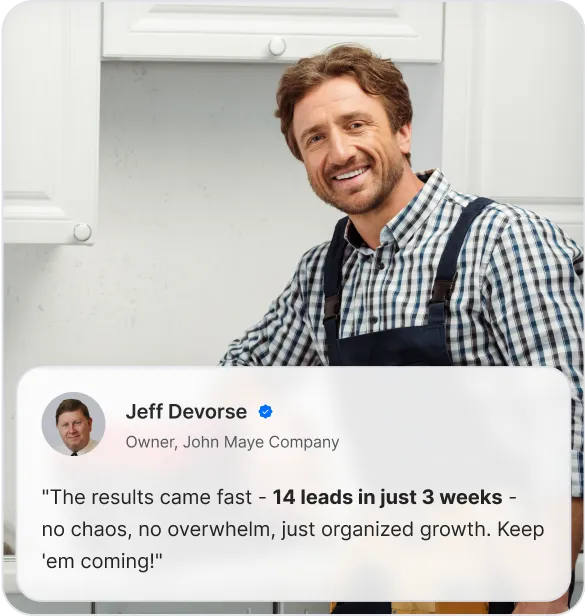Most manufacturers in the US have heard of SEO, but very few have actually seen real revenue from it. And honestly, it’s not your fault if you failed. Traditional SEO often feels too technical, slow, or disconnected from how your buyers actually search.
Here’s the thing: around 49% of B2B marketers who have tried SEO strategically agree that it delivers better ROI than any other marketing channel. The problem isn’t SEO itself, it’s how it’s usually done.
In industrial markets, buyers aren’t searching for broad marketing phrases like “best-in-class manufacturing” or “comprehensive engineering support.” They search for the exact part numbers, materials, tolerances, and processes. If your website doesn’t match the way they search, you lose deals to competitors who simply show up first.
Industrial SEO becomes simple once you align your pages with real buyer intent. This guide shows you how
Before We Dive In: What is Industrial SEO?
Industrial SEO is the practice of optimizing your website to appear on Google when buyers search for the products or services you offer. If someone types “laser cutting SS304 sheets”, SEO helps your website to show up right when the buyers need you.

Manufacturers today are using both traditional marketing, such as trade shows, referrals, and cold calls, along with digital marketing channels, such as SEO, paid (sponsored) ads, social media, email marketing, content marketing, and affiliate marketing.
Buyers compare vendors on Google, watch process videos on YouTube, download brochures, and request quotes directly from websites. Therefore, SEO stands out because it captures buyers at the exact moment they search for something specific.
SEO will work for you if:
- You handle high-ticket orders
- You rely on repeat clients
- Buyers ask for materials, product specs, and tolerances
- You don’t have a marketing team or have a small one
- You need steady leads, not seasonal spikes
If you are now ready to do SEO the right way, these are the core concepts you need to understand before anything else.
The Four Core Types of SEO for Industries

1. On-Page SEO
Optimize each page for buyers and Google.
On-page SEO means optimizing each page of your website for your buyers and search engines (like Google), so it shows up higher in search results (Search Engine Results Pages) and attracts the right buyers. This drives more business organically, meaning directly from Google (and other search engines like Yahoo, Bing, or Safari).
It includes using the right industrial keywords, writing strong titles and meta descriptions (brief info that appears below each title in the results page), structuring content with headings, improving internal linking (links leading to other relevant pages on your site), creating high-quality content, and ensuring the site loads quickly (under 3 seconds).
The research backs it up, too. The top 3 ranking factors of Google’s search results are high-quality content, page experience, and credible links.
2. Off-page SEO
Everything that happens BTS (behind the scenes) for your website.
Off-page SEO means building your company’s reputation and website authority through actions taken outside your site. This is mainly achieved by getting links from other trusted websites, earning mentions, and creating buzz on social media.
The process includes getting backlinks (votes of trust) from other authoritative sites, earning brand mentions, being discussed on social media, working with industry influencers, and building trust through reviews and directories.
3. Technical SEO
The tech behind your website.
Technical SEO is about optimizing the technical aspects of your website so search engines (Google) can easily crawl (read your page), index (store in its database), and understand your content to show it to your readers.
This means ensuring your site loads quickly, is mobile-friendly, uses HTTPS, has a clear site structure and URL format, uses structured data, and avoids issues such as duplicate content or broken links. This improves your site’s search engine visibility and user experience.
4. Local SEO
The “near me” searches
Local SEO focuses on optimizing your online presence to attract customers from specific geographic areas.
It includes managing your business listings (Google My Business), ensuring consistent name, address, and phone information across directories, collecting local reviews, using region-specific keywords, and optimizing for maps and location-based searches. This helps local buyers find and trust your business more easily.
Read more: SEO for Manufacturers: A Complete Guide
How to Improve SEO on an Industrial Website in 8 Simple Steps?
Most manufacturers fail at SEO because they do things the wrong way. Your SEO strategy works only if it follows a simple, yet impactful sequence:

1. Fix the Basics on Your Website (Before Anything Else Works)
Most manufacturers jump into technicalities too early. But SEO only works if your core pages are clean, readable, and fast.
Think of this as checking a machine before hitting “start.”
What you need to fix first:
- Clean page structure: Your homepage, services, capabilities, industries, and contact pages should be easy to read, with clear headings and scannable content.
- Clear messaging: Explain what you do, who you serve, and what materials/processes/capabilities you offer in simple language. (If it sounds too “sales-y,” your buyer won’t trust it). It should add value to your buyers.
- Fast loading (under 3 seconds): Industrial buyers open sites between calls, meetings, or shop-floor tasks. Slow = they bounce.
- Mobile-friendly layout: Many RFQs start from phones (surprisingly common for plant managers & purchasers).
- Simple navigation: Your buyer should find your capabilities, materials, industries you serve, your certifications, and your contact/forms–all in under 2 clicks.
- Strong CTAs (not salesy): Clearly state the Call-to-Action. For example, “Request a Quote”, “Upload Drawing”, “Get a Quick Estimate”, etc.
- Website Design: A clean, organized design builds trust, looks less “spammy” and more professional. It also improves usability, mobile-friendliness, and SEO, turning visitors into qualified leads.
If the foundation is weak, Google won’t show you with your competitors, and even if it does, buyers won’t convert. This fixes both problems at once.
2. Find the Right Industrial Keywords (What Buyers Actually Search)
This is where most manufacturers go wrong: they target broad, marketing-style keywords like “award-winning services” or “premium quality deliverables” instead of technical, buyer-intent keywords that focus on your niche.
SEO for industries only works when you use the exact words your buyers use on Google.
Here’s how you can do it:
- Part numbers: Mention the exact product details on your website. For example, SS304 flange, 6061 aluminum block, A286 fasteners, etc.
- Materials: Mention stainless steel machining, titanium fabrication, brass turning services, etc. – specific details.
- Capabilities/process keywords: For example, 5-axis CNC machining, laser cutting services, TIG welding mild steel
- Tolerances & specs: Mention ±0.01 mm machining, tight tolerance grinding
- Industry-use keywords: Add words like “aerospace machining supplier”, “medical device components manufacturer”, etc, specific to your niche.
These bring buyers who are interested in purchases.
How to find the keywords?
- Google autocomplete: Simply type your process → see what phrases show up.
- “People Also Ask” questions: Pull simple FAQs for blog and capability pages.
- Competitor website analysis: Check what top-ranking industrial competitors use on their pages.
- Use tools (if possible): Ahrefs and SEMrush to get keyword ideas with search volumes (the number of people searching for that keyword).
If you choose the wrong keywords, you’ll get minimal traffic and no leads.
With the right ones, you’ll attract buyers who are already comparing suppliers.

3. Create or Improve Your Service & Capability Pages (Your Biggest SEO Asset)
If keywords tell you what buyers search, capability pages are where those buyers land. These pages are the real lead generators in industrial SEO, not just blogs.
Here’s what every capability/service page must include:
- A clear, simple explanation of the process: Buyers don’t need stories. Just: what you do, materials you handle, and industries served.
- Exact capabilities: This is where industrial SEO shines. Include dimensions, equipment list, volume range (prototype → production), certifications, awards, case studies, etc.
- Real buyer-intent keywords: Add terms like “CNC machining for aluminum 6061”, “Laser cutting mild steel”, “Sheet metal bending services”. This is how Google matches you to technical buyers.
- Strong RFQ placement: CTA buttons should be the obvious next steps for your buyers, like “Request a Quote”, “Upload CAD File”, “Get Pricing”.
- Supporting images/tables: Machine list, material list, tolerance table — buyers love scannable info.
Simple page structure that works: Download this free customizable template
Most of the industrial traffic converts on these pages. Get them right, and SEO starts turning into real sales, not vanity traffic.
4. Build Technical, Industrial Blogs That Actually Rank (Not “Marketing Blogs”)
SEO for manufacturers or blogs isn’t meant for storytelling. Their job is simple: answer the exact technical questions buyers Google before choosing a supplier.
Here’s what industrial blogs should focus on:
- Process explanations: Explain your process of manufacturing. For example, how laser cutting works or what affects welding quality.
- Material comparisons: Write about SS304 vs SS316 for food equipment, Aluminum vs steel fabrication, etc.
- Tolerance & spec guides: Talk about how tight tolerances affect machining cost
- Industry-specific use cases: Mention exactly how things worked out in your industry. Write about the best materials for aerospace brackets and medical-grade machining requirements.
- “Problems buyers face” blogs: Speak about “why parts warp during machining”, or “how to reduce fabrication lead time”.
Simple blog template/dynamic outline that works for manufacturing blogs:
- H1 → exact topic
- Quick intro → 2–3 lines
- Clear sections (H2/H3)
- Specs, tables, examples
- Short FAQs
- CTA → Request a Quote / Upload Drawing
Remember, blogs don’t replace your capability pages; they push more qualified buyers to them.

5. Improve Your Technical SEO (The “Tech” That Makes Everything Smooth)
Think of technical SEO like machine maintenance — if the backend is slow, broken, or confusing, nothing else performs well. Google won’t rank you (show you on top), and buyers won’t stay.
Here are the technical fixes that matter most for manufacturers:
- Fast loading speed (under 3 seconds): Industrial buyers won’t wait. Slow pages = lost sales.
- Mobile-friendly pages: Buyers often search from industrial floors, warehouses, or even while traveling.
- Fix crawl errors & broken links: If Google can’t read (or crawl) your site properly, it won’t show it.
- Clear URL structure:
/services/cnc-machining/
/capabilities/laser-cutting/
Simple, clean, organized.
- Use HTTPS (secure site): Trust symbol for buyers + ranking benefit.
- Avoid duplicate content: Many manufacturers copy-paste product specs from catalogs → Google hates that.
These might seem overwhelming or too difficult in reality. However,
There are simple tools you can use (even if you're not “techy”):
- Google Search Console
- Google PageSpeed Insights
- Screaming Frog (even the free version helps)
You can have the best content in the world, but if your site loads slowly, breaks, or confuses Google, you’ll never rank. Technical SEO removes this friction so your pages can actually show up and convert.
6. Strengthen Your Off-Page SEO & Authority (Earn Google’s Trust Like a Real Supplier)
Off-page SEO is just a fancy way of saying: “Get other trusted websites to vouch for you.”
In the industrial world, it works exactly like vendor verification.
The more credible sources mention or link to you, the higher Google ranks you.
So, where do manufacturers earn high-quality backlinks:
- Industry directories: ThomasNet, MFG, GlobalSpec, Engineering360
(These count as legitimate trust signals.) - Supplier listings & certifications: ISO directories, vendor approval lists, material supplier sites.
- Industry associations & trade bodies: Welding associations, machining groups, metal fabrication forums.
- Guest posts on industrial blogs: Write simple technical explainers (not marketing fluff).
- Case studies & project showcases: When clients share your work on their websites → free backlink.
Simple off-page activities your team can realistically do:
- Get listed everywhere your competitors are listed: If they have 20 directory links and you have 2, they win.
- Ask satisfied clients for a short review: Google reviews, especially with photos, boost local SEO.
- Share technical content on LinkedIn: Engineers reposting your content = natural backlinks.
- Submit your work to niche communities: Machining, fabrication forums — these count as mentions.
Google sees backlinks as proof of reliability, just as buyers check certifications or previous work before placing an order.

7. Optimize your local SEO for “near me” buyers
Many manufacturers often ignore local intent searches like “industrial supplier near me”, losing high-intent buyers who prefer nearby vendors.
Local searches convert faster — nearby buyers usually need quick turnaround, easier logistics, or proven reliability.
Here’s what to fix:
- Optimize your Google Business Profile
- Add clear service areas, categories, and product lists
- Build local citations on credible industrial directories
- Create geo-specific pages (e.g., CNC machining in Dallas)
- Add location keywords naturally in core pages
You show up for local “near me” searches, bringing in fast-moving, high-intent RFQs from buyers who want a supplier they can reach quickly. Look out for industrial SEO companies that can help you with these.
Suggested Read: 15+ Manufacturing SEO Companies
8. Track what brings Sales (and Double Down)
Most manufacturers “do SEO” but never check which pages actually attract leads— so they keep guessing instead of scaling what already works.
When you track performance, you see which keywords, pages, and tweaks bring real buyers… not just traffic.
Here’s what to keep in check:
- Track form fills by page (which URLs generate form fills or calls) – Google Analytics can help.
- Keep track of how your most important pages, those that generate leads or sales, rank on Google for the keywords your buyers type.
- Check page speed, bounce rate, and time on page
- Compare organic leads vs. paid or referral
- Update winning pages monthly to keep rankings climbing
Once you start tracking what’s driving real RFQs, you’re no longer “doing SEO.”
You’re running a 24/7 revenue engine.
Which Metrics Matter the Most for Industrial SEO?
The most important SEO metrics for industrial manufacturers to focus on include:
- Organic Traffic: The number of visitors coming from search engines, without paying for it, shows how well your SEO is driving prospects to your site.
- Keyword Rankings: Tracking how your key products and industry terms rank in search results helps you gauge your visibility.
- Conversions: Measuring quote requests, contact form submissions, or direct sales from organic search reveals the SEO impact on lead generation.
- Click-Through Rate (CTR): The percentage of searchers who click your site after seeing it in results indicates the effectiveness of titles and descriptions.
- Backlinks: The number and quality of external sites linking to you show your site’s authority and trust in the industry.
- Page Load Speed and Mobile Usability: Technical factors that ensure a good user experience and prevent visitors from bouncing due to slow or hard-to-navigate sites.
- Local Search Visibility: For manufacturers targeting specific regions, tracking local listings, map presence, and localized search rankings matters.
Most manufacturers don’t track SEO because analytics dashboards look confusing. But you just need five simple metrics to know whether your industrial SEO is working.
Choose what applies to you:
- Your service pages get more visitors than last quarter
- Your RFQs now mention “found you on Google”
- Your core keywords moved up in search results
- Your buyers spend more time on technical pages
- You get repeat traffic from the same companies
If your answer is 2 or more, your SEO is moving in the right direction.
Simple SEO Tools Manufacturers Can Use (Free or Low-Cost)
- Google Analytics: Traffic, engagement, conversions.
- Google Search Console: Rankings, keywords, page issues.
- Bing Webmaster Tools: Free ranking + keyword insights for Bing (many industrial buyers still use it).
- Ubersuggest (Free Tier): Simple keyword research and content ideas without complex dashboards.
- WordPress SEO Plugins (Yoast/RankMath): Helps small teams fix basic SEO issues directly inside WordPress (titles, meta tags, readability, sitemap, etc.).
With these simple tools, you can manage the basics, but do you know when to call in an SEO professional?
When Should You Hire an Industrial SEO Expert?
Most manufacturing teams can handle the basics of SEO until they hit one of these walls. If any of these sound familiar, it’s time to bring in an industrial SEO agency expert:
- Your rankings just won’t move: You’ve added keywords, fixed your pages, maybe even blogged, but your important pages still sit on page 2 or 3. This usually means you need stronger technical SEO and authority building.
- Your traffic is stuck at the same number: If your organic traffic hasn’t grown in 3–6 months, something deeper is limiting visibility, usually site structure, thin content, or poor keyword targeting.
- DIY (Do-It-Yourself) SEO is taking too much of your time: If the person running SEO is also running operations, sales, or production, SEO becomes inconsistent. Industrial SEO requires steady execution, not once-a-month fixes.
- Your pages get views but don’t convert: If people visit your pages but you get no RFQs, that means the content doesn’t match industrial intent. An expert can fix page structure, offers, and buyer-focused content.
- You need SEO that can actually scale: When you start adding new product lines, service pages, or technical guides, manual SEO becomes too slow. Experts bring systems, processes, and content engines that you can’t quickly build in-house.
Once you know when you need an SEO industry expert, figure out who actually knows industrial SEO and who’s just selling generic marketing services.
SEO Questions Industrial Owners Should Ask
Before you hire anyone, ask yourself (and them) these questions:
1. Do they understand industrial processes?
If they can’t explain in your buyer’s language: tolerances, materials, machining terms, or manufacturing workflows, they cannot create pages your buyers trust.
2. Can they create content that engineers respect?
Buyers want spec-driven pages, not fluffy marketing text. Ask for samples of technical blogs, product pages, and process guides.
3. Do they provide keyword research tied to specs?
They should deliver keyword lists based on your industrial niche. This includes the specifics of your services, like product specs, capabilities, industries, and applications.
4. How fast can they produce pages?
Industrial companies can’t wait 3–6 months for content. Ask how long it takes them to research, write, review, and publish a technical page. There are AI-powered companies that can generate 6 months of industrial content in 4-5 weeks.
5. What KPIs will they track for you?
Look for real metrics tied to revenue:
- Qualified leads from organic (website) traffic
- Ranking movement for priority service pages
- Traffic to capability pages
- Engagement on technical blogs
If they talk only about “likes,” “impressions,” or “brand awareness,” that’s not industrial SEO. They should speak of “clicks”, “conversions”, “leads”, “sales”, “week-on-week growth”, and “revenue”.
How Industrial SEO Is Different From “Regular” SEO
When manufacturers hear terms like industrial marketing SEO, industrial search engine optimization, or SEO for industrial companies, it often sounds like the same SEO everyone else is doing—just with a different label.
It’s not.
Industrial SEO is fundamentally different from generic SEO because industrial buyers search differently. They don’t search by brand slogans or marketing language. They search by process, material, tolerance, industry, and specification.
That’s why SEO for manufacturing companies focuses less on volume and more on precision. For example:
- A consumer SEO strategy might target broad terms.
- Manufacturing SEO targets searches like “CNC machining SS316 tight tolerance” or “industrial laser cutting supplier Texas.”
This is what sets industrial search engine optimization apart from traditional SEO. In industrial markets, fewer searches often mean higher intent and higher deal value.
Because of this, SEO in the manufacturing industry works best when it’s tightly connected to:
- Capability pages (not just blogs)
- Technical accuracy (not marketing fluff)
- Real buyer language used by engineers and procurement teams
This is also why many manufacturers struggle when they work with generalist SEO vendors. An industrial SEO marketing agency must understand how industrial buyers search, or traffic will not translate into RFQs.
In short, SEO for industrial companies isn’t about ranking everywhere. It’s about ranking exactly where buying decisions start.
Remember,
SEO Is Not Complicated. It Just Needs the Right Approach
When you align your pages with how real buyers search, results stack month over month. Industrial niches actually have less competition, which means even a small factory can outrank bigger players with consistent, technical content.
Start simple, stay focused, and SEO becomes one of your most reliable lead engines.
Gushwork helps industrial manufacturers get more website traffic and sales by creating content that attracts the right buyers, fast and hassle-free. Talk to an expert today!








.webp)













.webp)








.webp)
.svg)


.svg)
.svg)
.svg)




.svg)


